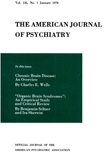Effects of an ACTH short chain neuropeptide in man
Abstract
The authors studied the effect of an ACTH 4-9 analogue (the shortest behaviorally active fragment of the ACTH neuropeptide) on mood in normal aging volunteers. These mood changes, described as a sense of well-being, energy, and drive, are consistent with an arousal-stimulant mechanism of action of the compound. No effect of the compound was found on attention or memory. Because of its apparent safety and the lack of adverse effects, the authors suggest that this short chain neuropeptide be further explored in older individuals for its mood- elevating and potential antidepressant properties.
Access content
To read the fulltext, please use one of the options below to sign in or purchase access.- Personal login
- Institutional Login
- Sign in via OpenAthens
- Register for access
-
Please login/register if you wish to pair your device and check access availability.
Not a subscriber?
PsychiatryOnline subscription options offer access to the DSM-5 library, books, journals, CME, and patient resources. This all-in-one virtual library provides psychiatrists and mental health professionals with key resources for diagnosis, treatment, research, and professional development.
Need more help? PsychiatryOnline Customer Service may be reached by emailing [email protected] or by calling 800-368-5777 (in the U.S.) or 703-907-7322 (outside the U.S.).



